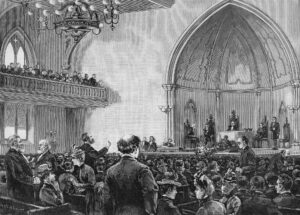“How long, O Lord? Will you forget me forever? How long will you hide your face from me? How long must I take counsel in my soul and have sorrow in my heart all the day? How long shall my enemy be exalted over me?”
– Psalm 13:1-2
Look at all those questions! In the New Testament, we usually find propositional statements. But in the Psalms, we often find questions and displays of uncertainty. It is a restrained uncertainty that retains its core of faith, but it is uncertainty nonetheless.
Deconstruction Stories
For many years I have been a student of deconstruction stories. Deconstruction in a religious context is the taking apart and examining of one’s faith, sometimes then reconstructing it but often not. This has become quite a mainstream phenomenon in our day.
I was never told that it was wrong to ask questions; I was encouraged to ask, to jump into the deep end and learn to swim.
At its heart, deconstruction is taking apart your existing engine, inspecting the components, cleaning up or replacing the parts that are worn out or not working, and then putting the engine back together again. It’s like taking apart an elaborate Lego structure that has been built up in pieces and sections over years, laying all the pieces on the table, and then putting all the parts back together, getting rid of some and adding others, into a more coherent structure.
Some decide the entire engine or Lego structure is a sham and they need to start from scratch. In some cases, that’s not a bad idea; in others, a lot of good components are needlessly discarded.
Are my Questions Welcome?
It saddens me that what is often mentioned in stories of deconstruction as the fuel for the journey is some version of being raised in a church where questions were not allowed. Questions were dangerous and needed to be put on a shelf. In reality, based on my experience, this was often the advice of Christians and church leaders who have not themselves contemplated many of the deeper aspects of their faith.
In conversing with atheists, initially around 2007 (when I was making my way through “The God Delusion” by Richard Dawkins) I discovered that there’s a bit of an unofficial test applied among atheists where within 4-5 questions they can stump and scare off most Christians. It’s a bit of a game and according to my atheist interlocutors, a game they most often win. These were fairly rudimentary questions about the Christian faith, the answers to which did not require even an undergraduate degree in philosophy.
Set Up to Fail
As with many other reasons people deconstruct and don’t come back, I am appalled at this one. But what did we expect to happen to a generation raised on shallow entertainment-based Christianity that often encouraged idolatrous and unholy alliances with politicians and their parties? What did we expect to happen to people who were given pools of theology to wade into that didn’t even rise to their ankles?
They asked hard questions of their churches and received a tsk-tsk, a finger-wag, and a “Don’t do that again!” in response. Many were not even given the courtesy of a reply they could disagree with. They turned elsewhere and received more information than they could consume – and off they went, often never to return. Sadly, they learned that there is precious little time for important theological questions when the bulk of your time is dedicated to winning a culture war.
And all of this has led to as much nominalism as it has apostasy. Well, maybe apostasy is not always the right word. People sometimes deconstruct what never should have been constructed in the first place, and that is not a bad thing. But often in their confusion and disillusionment, they end up throwing out what was good along with the bad.
Deconstructing my Deconstruction
I had my own experience of deconstruction around 2005-2007. My journey was unlike those of many today. Rather than leading me out of the church, mine led me deeper into the church, but I was really out there for a while. I had all the pieces on the table. I took some pieces off the table and left them there and others I later put back on. It was a difficult time for me and my family, so if you’re on the same journey, I understand what it’s like!
In the end, I seemed to be mostly cured of my pervasive cynicism about Christianity. To be more accurate, I ceased to feel guilty about applying a cynical eye to the many intentionally shallow and bogus manifestations of Christianity that are commonplace today. This allowed me to see and embrace the more genuine and serious expressions of the faith that have been tested by time and found to produce disciples of Jesus who look like Jesus.
My confidence in Christ and his church grew – not because I looked at church history and refused to believe all the bad things that had been done in the name of Christ. Not at all. It was by taking an honest look and processing what I saw that my faith was nursed back to strength.
The End of the Middle of the Story
In the end, after years of hard struggle and deep contemplation, I was able to reconstruct the basic framework of my faith almost completely with the pieces I had been given by my parents. But now no longer was I living in my parents’ house; the house was now my own.
The point is that all of this came about because I asked questions. I was never told that it was wrong to ask questions; I was encouraged to ask, to jump into the deep end and learn to swim.
As a result, I became a strong swimmer – which is a good thing because I find that I still encounter deep waters and dark waves.
First published here and used with permission.
























